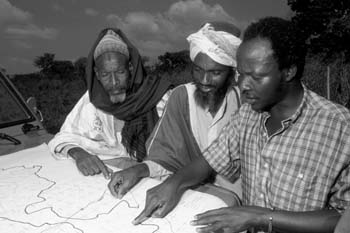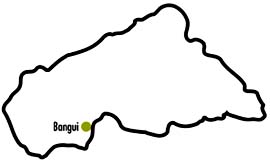
KEY FACTS
Population: 3.8 million
GDP per capita: US$ 302
Population below poverty line: 73%
Labour force by occupation: agriculture 55%, industry 20%, services 25%
Total land area: 622 984 sq km, bordering Cameroon, Chad, Democratic Republic of the Congo, Republic of the Congo, and Sudan.
Total arable land: 3.1%
Life expectancy: male: 39 years; female: 43 years
Literacy rate: male: 63.3%; female: 40%
Human Development Index: 171/177
(Source: UN; World Bank; CIA Factbook)

FAO IN CENTRAL AFRICAN REPUBLIC
Despite weak donor response, FAO was able to undertake several key activities in Central African Republic in 2005, including provision of assistance under FAO’s Special Programme for Food Security, support to the country’s agricultural statistics, and support to rural professional agricultural organizations.
Background
Despite abundant natural resources, the Central African Republic is one or the world’s poorest countries, suffering from a deep structural crisis that has emerged from more than a decade of internal conflicts. Public infrastructure and private resources have been destroyed or looted. Approximately 73 percent of the population lives in abject poverty, surviving on less than one US dollar a day. Chronic malnutrition affects 39 percent of the population, with some 10 percent of children suffering from severe malnutrition. The rate of HIV/AIDS in the country (15 percent nationally, in some areas as high as 35 percent) is the highest in the region. Tens of thousands of refugees have fled Central African Republic to neighboring countries, such as Chad and Cameroon, adding to regional insecurity.
The security situation has slightly improved after a coup in August 2003 and the subsequent establishment of an Interim Government and a National Transition Council that is arranging for upcoming elections. However, general insecurity prevails, characterized by arms trafficking, acts of violence and hostage taking by armed bandits.
The alarming situation in the Central African Republic has not been sufficiently noticed by the international community. FAO was able to cover only 13 percent of its appeal last year.
Needs analysis: Food security and agriculture sectors
The Central African Republic has a climate favourable for agricultural production. During normal conditions, its people would be able to cover their nutritional needs. However, the present situation is creating a disastrous increase in general poverty and food insecurity.
Vulnerable farming populations, including female-headed households and those affected by HIV/AIDS, require assistance to rebuild and protect their livelihoods. Special attention must also be given to the tens of thousands of refugees who will require assistance to resettle. With some 40 percent of the water pumps in rural areas not functioning, rural populations also need assistance in rehabilitating their water systems. People living in urban and semi-urban areas are also subject to food insecurity and require nutritional support, for example, through vegetable gardening.
FAO will provide improved seeds and agricultural inputs like tools and fertilizers. Technical assistance, logistical support and training will be offered to improve food security. Cattle herding communities have been particularly gravely affected by the conflicts and need assistance in restocking their herds, having their grazing areas delimited, as well as obtaining veterinary services and capacity building. Special attention will also be given to rural communities in central areas of the country seriously affected by the flooding in August 2005.
PROPOSALS
FAO RELIEF AND REHABILITATION ASSISTANCE
Funding
required: US$ 1 500 000
|
Emergency assistance to farmers affected by the August 2005 floods in the Central African Republic |
Issues addressed: Torrential rains severely affected public health, access to potable water and agricultural production - in particular swamp cultivation, garden plots and cattle farms - causing acute food insecurity among vulnerable populations.
Objectives: Allowing farmers from rural and peri-urban centres (Bangui, Bouar, Bambari, Sibut, Alindao et Bangassou) to resume their agricultural activities.
Activities: Procurement of seeds and other agricultural inputs, as well as capacity building in agricultural techniques.
Beneficiaries: Approximately 6 500 farmers in 165 groups from Bangui and the districts of Ombella M’Poko, Nana-Mambere, Ouaka, Kemo, Basse-Kotto and Mbomou.
Implementing partners: Ministry of Agriculture and Livestock, in cooperation with local NGOs.
Duration: January 2006 - December 2006.
Funds requested: US$ 580 000.
|
Emergency distribution of inputs for the resumption of agricultural activities to assist the resettlement of 15 000 Central African refugees from Chad and the rehabilitation of 8 000 indigenous persons |
Issues addressed: Agricultural production was severely harmed by the 2002-2003 political crises and armed conflict, in particular cotton production, the most important income generating product of the region. The crises caused a massive exodus to Chad. Returning refugees and indigenous populations are now in need of assistance to resume their livelihoods.
Objectives: To make it possible for farmers from the most affected districts to resume their production activities.
Activities: Procurement of seeds and other agricultural inputs, as well as capacity building in agricultural techniques.
Beneficiaries: 23 000 farmers organized in groups from the districts of Ouham, Ouham-Péndé, Nana-Grébizi.
Implementing partners: Ministry of Agriculture and Livestock, in cooperation with local NGOs.
Duration: February 2006 - December 2006.
Funds requested: US$ 680 000.
|
Support to the management of transhumance corridors in the northern regions of the Central African Republic |
Issues addressed: After 2002, two entire harvests were lost due to armed conflicts in five districts. The resulting food crises deepened during 2005, and 500 000 persons are now threatened by severe food insecurity. The situation is aggravated by badly controlled cattle herds threatening agricultural production.
Objectives: Ensuring the security of agricultural smallholdings and livestock breeding and reduce farmer/breeder conflicts over the management of agricultural areas and pastures. To reinforce the capacities of technical breeding services.
Activities: Restrict and limit transhumance areas. Sensitizing farmers and herders to respect the restricted areas. Increase veterinary capacities and procure veterinary inputs. Offer technical assistance to concerned ministries and governmental agencies.
Beneficiaries: 180 000 persons.
Implementing partners: FNEC, ANDE and the Ministry of Rural Development.
Duration: January 2006 - December 2006.
Funds requested: US$ 240 000.